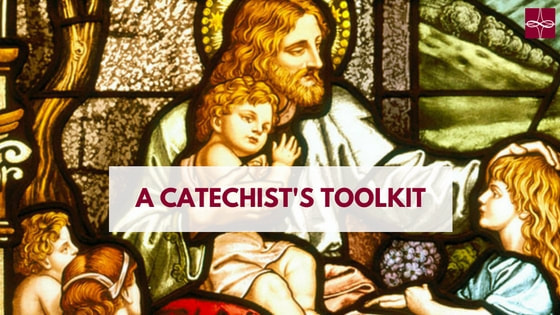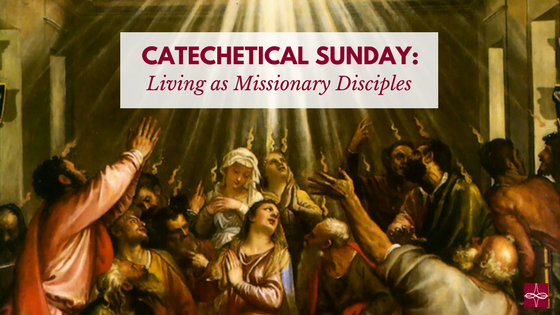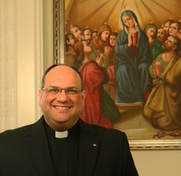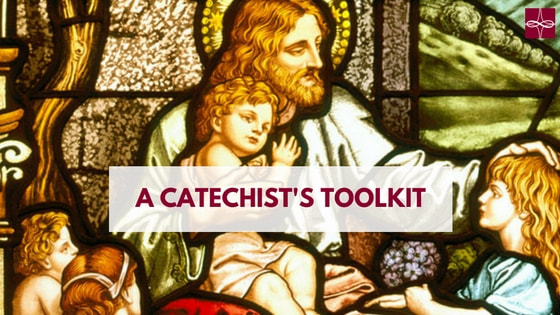|
This year, the theme for Catechetical Sunday (September 16th) is “Enlisting Witnesses for Jesus Christ.” This day is a reminder that all of the baptized play a role in the mission of sharing Christ with others, whether that be through formal or informal ministry. This mission seems pressing today. In Bishop Robert Barron’s 2018 message for Catechetical Sunday, he says we are losing baptized Catholics at an alarming rate. In a Pew Research report, we see that Americans who identify as atheists or agnostics make up about 23% of the U.S. adult population. This group of religiously unaffiliated individuals, or “nones,” is mostly concentrated among young adults, and the median age of unaffiliated adults continues to get younger. Of this population, those who describe themselves as agnostic or “nothing in particular” cite their top reason for not affiliating with a religion is that they question a lot of religious teachings. Having questions is actually an essential part of learning about and understanding the Catholic faith; only when we question can we begin to move beyond a lack of understanding and come to learn the truth of the Gospel. God desires for us to use our intelligence to come to know him before acting upon our faith. The majority of young adults and “nones” find value in meaningful relationships over institutionalism and in authenticity over authority (Halbach). This shows us that the Church can engage the “nones” by forming relationships in order to accompany them along the journey of life. In the mission to bring Christ to others, we serve as authentic witnesses to the Good News of the Gospel through our lives. The Church needs the active participation of the laity to conduct outreach efforts in the everyday moments of our lives, both inside and outside of the Church. We were created to be social beings who can form relationships with others that will lead them to Christ and to the Church. Much of this relationship building happens organically in our communities and parishes. For example, a couple of weeks ago, my parish young adult group heard that the grandmother of one of our new members had passed away. After hearing this news, we wrote and signed a sympathy card to mail her. By this small act of love for our fellow sister in Christ, we were able to show our genuine care for her and our desire to welcome her back to church after her travels for the funeral. As missionary disciples, we know that there is no one “right” path to building these relationships and caring about those around us. This allows us to share our innate gifts creatively with others in order to build authentic relationships. Furthermore, sharing our own faith stories of personal encounters with Christ helps us to accompany others on their faith journeys as well. We must show others that we love them through our actions rather than our words. Christ enlists us as his witnesses. This Catechetical Sunday, how can you respond to his call? Questions for Reflection: Are we open to questions about our Catholic faith in helping ourselves and others come to know God? Are we preparing ourselves to be able to answer questions from others about the faith in a rational manner? What are some ways you can begin to build authentic relationships with others in your community or parish? How are you building personal relationships with others in context of your faith journey? To learn more about living as missionary disciples, click here.
0 Comments
“The word of God nourishes both evangelizers and those who are being evangelized so that each one may continue to grow in his or her Christian life” – National Directory of Catechesis Over the last 40 years, the United States Conference of Catholic Bishops (USCCB) has especially recognized the importance of catechists in the process of evangelization by reserving the third Sunday in September as “Catechetical Sunday.” Catechetical Sunday commemorates and celebrates the ministry of formal catechesis, which is the systematic teaching of the tenets of the Catholic faith in order to help others know more about God and his Church. This ministry has had a significant role in my life over the past four years and across two different dioceses. There is something amazing about trying to explain the Old Testament prophets to a group of 6th grade students, a majority of whom has never heard the likes of Jeremiah, Isaiah, Elijah, etc. I love seeing the excited faces of students that either know or are interested in the subject of my teaching, while the blank ones challenge me to find compelling ways to make the faith a living part of their lives. On Catechetical Sunday, parishes, including where I have served, have a particular ritual: before the recessional at the end of Mass, the celebrant asks all who are called to serve as catechists to stand and receive a blessing for their work throughout the year. This serves two purposes: it helps the catechist understand the importance of their teaching role in the parish and also serves as a moment of reflection for the rest of the congregation. The influence of a catechist on a young life cannot be understated. Below are a few tips I’ve learned throughout my time as a catechist that can help those interested in pursuing the ministry of catechetical formation.
Catechetical Sunday reminds us of our individual roles in the evangelization of the baptized. In our small way, my fellow catechists and I—men and women from all walks of life and individual faith journeys—try to sow the fruits of faith for the next generation of disciples. Pulling from my toolkit, I will leave you with a blessing for catechists: “Lord God, source of all wisdom and knowledge, you sent your Son, Jesus Christ, to live among us and to proclaim his message of faith, hope, and love to all nations. In your goodness bless our brothers and sisters who have offered themselves as catechists for your Church. Strengthen them with your gifts, that they may teach by word and by example the truth that comes from you.”
“Dear catechists, I thank you for what you do, but especially because you walk with the People of God. I encourage you to be joyful messengers, custodians of the good and of the beauty which shines through the faithful life of the missionary disciple.” – Pope Francis (Message to Participants in the First International Catechetical Symposium, July 5, 2017) On September 17, the Catholic Church in the United States will celebrate Catechetical Sunday with the theme, “Living as Missionary Disciples.” This theme is taken from the apostolic exhortation of Pope Francis, Evangelii Gaudium (The Joy of the Gospel). The recent Convocation of Catholic Leaders focused the Church in the United States on ways in which we can live the “The Joy of the Gospel in America.” In a time in the United States that is marked less by joy, love, peace, and unity and more by anguish, hate, violence, and division, the work of missionary disciples, and particularly those who form missionary disciples, is critically important. Catechists are called to joyfully witness and teach the faith not simply as a set of rules, regulations, or esoteric beliefs, but as true life and freedom in Jesus Christ. The mission field of the catechist is a vast one in our culture today. The classroom is only one place of witness and teaching. More so, we witness the love of Christ in workplaces, schools, and families, among friends, in the public square, and even in a ministry, apostolate, or parish church. As the Bishops of the United States teach, “We become missionary disciples when we take our encounter with Jesus Christ out into the world” (Living as Missionary Disciples, 17). We, then, as the baptized, must witness Jesus Christ in the world, not simply in the Church, responding to the love of Christ that we have encountered. We are sent into the world to accompany others into their own encounter with Jesus Christ and the community of faith, the Church. This is how we live as missionary disciples. This is how we evangelize most effectively, not simply by words, but particularly by deeds. As St. Vincent Pallotti said almost two centuries ago, “Remember that the Christian life is one of action; not of speech and daydreams. Let there be few words and many deeds, and let them be done well." May the Charity of Christ urge us on!
“The word of God nourishes both evangelizers and those who are being evangelized so that each one may continue to grow in his or her Christian life” – National Directory of Catechesis Over the last 40 years, the United States Conference of Catholic Bishops (USCCB) has especially recognized the importance of catechists in the process of evangelization by reserving the third Sunday in September as “Catechetical Sunday.” Catechetical Sunday commemorates and celebrates the ministry of formal catechesis, which is the systematic teaching of the tenets of the Catholic faith in order to help others know more about God and his Church. This ministry has had a significant role in my life over the past four years and across two different dioceses. There is something amazing about trying to explain the Old Testament prophets to a group of 6th grade students, a majority of whom has never heard the likes of Jeremiah, Isaiah, Elijah, etc. I love seeing the excited faces of students that either know or are interested in the subject of my teaching, while the blank ones challenge me to find compelling ways to make the faith a living part of their lives. On Catechetical Sunday, parishes, including where I have served, have a particular ritual: before the recessional at the end of Mass, the celebrant asks all who are called to serve as catechists to stand and receive a blessing for their work throughout the year. This serves two purposes: it helps the catechist understand the importance of their teaching role in the parish and also serves as a moment of reflection for the rest of the congregation. The influence of a catechist on a young life cannot be understated. Below are a few tips I’ve learned throughout my time as a catechist that can help those interested in pursuing the ministry of catechetical formation.
Catechetical Sunday reminds us of our individual roles in the evangelization of the baptized. In our small way, my fellow catechists and I—men and women from all walks of life and individual faith journeys—try to sow the fruits of faith for the next generation of disciples. Pulling from my toolkit, I will leave you with a blessing for catechists: “Lord God, source of all wisdom and knowledge, you sent your Son, Jesus Christ, to live among us and to proclaim his message of faith, hope, and love to all nations. In your goodness bless our brothers and sisters who have offered themselves as catechists for your Church. Strengthen them with your gifts, that they may teach by word and by example the truth that comes from you.”
As the Year of Faith draws to a close I can’t help but be inspired by God’s work in the life of the Church. From the outreach of Pope Francis, to the catechetical workshops in my current diocese, to the daily life stories of those in my parish, there is a momentum behind the constancy and strength of faith. St. Ireneaus writes, “A human being fully alive gives glory to God,” and how fitting it is to explore the meaning of being fully alive in the context of faith. The Church in its universal and personal faith journey aches to become more alive!
Faith is one of the three theological virtues; we are asked to believe what God has revealed to us in Himself, and to bear witness to His truth through the other two virtues of hope and love (CCC 1814-1816). By saying that we believe in God, what He has done for us in love, and to live as a witness to that understanding, we have expressed the desire to know Him. The Jesuit theologian Karl Rahner remarks, “Faith means putting up with God’s incomprehensibility for a lifetime.” Indeed, we venture into the unknown in order to know God. Growing in this way is an inexhaustible task! And we are asked to “put up” with the mystery of who God is in order to live a full life. To live a life fully alive is a challenge in this world of amusement. We are a part of a culture that is distracted by entertainment, technology, and immediate gratification. There is a focus on having control over this busy life. Self-improvement and self-care books fill shelves. Articles and talk shows tell us that we have the power to make ourselves the best that we can be. In many ways that can be positive encouragement, but without faith in a God who governs the human heart it is an empty message. Faith gives meaning to this life and shows us what is to come in the next. More than any other happiness or encouragement the world offers to feel fully alive, God speaks to the deepest desire of the heart. Pope Emeritus Benedict XVI defines faith in his translation of Hebrews in Spe salvi, “Faith is the substance of things hoped for, the proof of things not seen” (Hebrews 11:1, Spe salvi 7). Faith gives us the best momentum to live a life that is fully alive because it is a concrete reality. We may not be able to measure out faith in a measuring cup, but the value of its effects are seen in those we meet and in our own actions. It is constant, certain, and strong and gives us a foretaste of the joy of heaven (CCC 161,163). I have recently worked with a third grade class, middle and high school group, and my pastor’s adult formation class in framing an understanding of faith. Taking the lived experience of a parish community alongside what I study as a graduate student has led me to see how faith is being cultivated in my own life. I do feel more alive than when I pray for clarity and invite God into the relationships and situations of each day. By believing that he is at work in my life, I grasp at how to live the story of the mustard seed, teach the Creed, and consider the people and ideas in the life of the Church. From individuals to local communities and beyond the desire to know and love a God who desires us draws us to more fervent faith. “Great is his steadfast love toward us; and the faithfulness of the Lord endures forever,” says Psalm 117. Let us endure and live more fully in what we believe as God does in us! Sophie Jacobucci serves as a second-year Echo Apprentice in the Diocese of Manchester, NH. |
Details
Archives
July 2024
Categories
All
|
About |
Media |
© COPYRIGHT 2024 | ALL RIGHTS RESERVED










 RSS Feed
RSS Feed